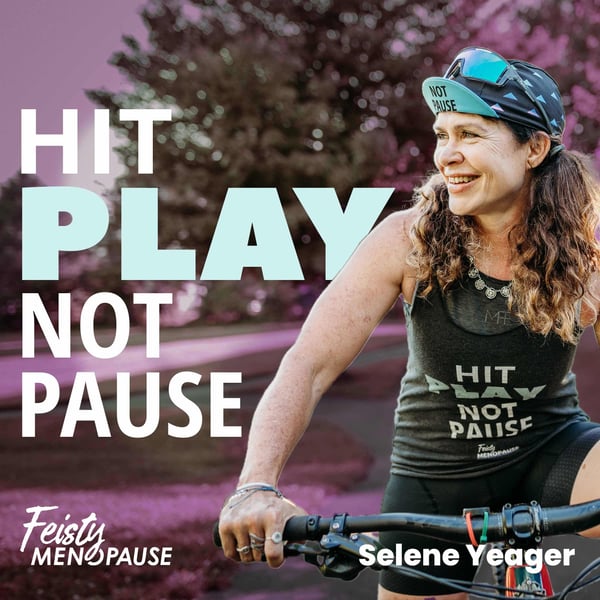Why You Can Probably Worry Less About Blood Sugar with Nicola Guess, RD, MPH, PhD (Episode 210)
Hit Play Not Pause
Hit Play Not Pause
4.9 • 696 Ratings
🗓️ 22 January 2025
⏱️ 60 minutes
🧾️ Download transcript
Summary
Spikes, crashes, excursions, and elevated numbers. Blood sugar is on a lot of active midlife women’s minds. But what do we really know about what this all means…and what it doesn’t, especially when it comes to long term health? This week’s guest Oxford nutrition scientist and globally recognized type 2 diabetes expert Dr. Nicola Guess helps sort through all things elevated glucose and helps separate what we need to worry about with what we don’t.
Nicola Guess, RD, MPH, PhD, is a dietitian based in London specializing in the prevention and management of type 2 diabetes. She is currently an associate professor at the University of Westminster, Research Fellow at King’s College London, and Head of Nutrition Research at the Dasman Diabetes Institute in Kuwait. She also runs her own private clinical practice. Her primary research interests are in the prevention and management of type 2 diabetes, including the effects of nutrients on the underlying pathophysiology of type 2 diabetes. Dr Guess is a National Institute of Clinical Excellent (NICE) scholar investigating meal provision for inpatients with diabetes; a member of the NICE expert committee; a member of the Diabetes UK Clinical Study Group, and previously a Winston Churchill Travel Scholar investigating approaches to type 2 diabetes prevention in the UK and China and a Diabetes UK Academic Health Partnership Fellow investigating the role of diet in the prevention of type 2 diabetes. You can learn more about her work and follow her research at drguess.substack.com/
Resources
Erratic glucose in normoglycaemic athletes: insufficient protein? blog
How useful are CGMs for athletes? blog
Blood Glucose Levels of Subelite Athletes During 6 Days of Free Living, Journal of Diabetes Science and Technology (JDST)
Enroll in our Navigate Menopause Course - https://www.feistymenopause.com/navigate-menopause
Subscribe to the Feisty 40+ newsletter: https://feistymedia.ac-page.com/feisty-40-sign-up-page
Follow Us on Instagram:
Feisty Menopause: @feistymenopause
Hit Play Not Pause Facebook Group: https://www.facebook.com/groups/807943973376099
Support our Partners:
Hettas: Use code FEISTY20 for 20% off at https://hettas.com/
Midi Health: You Deserve to Feel Great. Book your virtual visit today at https://www.joinmidi.com/
Nutrisense: Go to nutrisense.io/hitplay and use code: HITPLAY to get $125 off
Previnex: Get 15% off your first order with code HITPLAY at https://www.previnex.com/
Paradis Sport: Use code: FEISTY20 for 20% off any single item at https://paradissport.com/
This podcast uses the following third-party services for analysis:
Spotify Ad Analytics - https://www.spotify.com/us/legal/ad-analytics-privacy-policy/
Podcorn - https://podcorn.com/privacy
Podscribe - https://podscribe.com/privacy
Transcript
Click on a timestamp to play from that location
| 0:00.0 | You are listening to Hit Play, Not Pause, a feisty menopause podcast for active performance-minded women. |
| 0:14.6 | I am your host, Celine Yeager. Each week, I bring you advice from athletes, scientists, researchers, and other experts to help you feel and perform you best, no matter what your hormones are doing. |
| 0:25.0 | This show is a production of Live Feisty Media. |
| 0:31.2 | Hello, strong feisty women. |
| 0:33.5 | I hope you all are well. |
| 0:35.9 | So this week is a follow-up of sorts to a show that I did with |
| 0:40.3 | Val Schoenberg on what to know about pre-diabetes and menopause. And in that show, Val and I talked |
| 0:47.0 | about how, quote-unquote, pre-diabetes isn't really recognized as a diagnostic category by the |
| 0:53.0 | World Health Organization. And we focused on the World Health Organization and we focused |
| 0:55.9 | on the role of hormones and diet and lifestyle on blood glucose levels. I encourage you to go back |
| 1:00.6 | and check that one out if you missed it because this week we're going in again and we're |
| 1:05.8 | going to talk more about how endurance training enters this picture. And as I've talked about previously |
| 1:13.0 | on this show, fasting blood glucose has long been an interest of mine. In fact, I started digging |
| 1:19.3 | into how endurance training can affect it nearly 10 years ago when a study was published that found |
| 1:25.7 | that contrary to expectations, many endurance athletes |
| 1:29.3 | have higher fasting blood sugar levels than one would anticipate. |
| 1:33.9 | And full disclosure, I have long been one of those athletes. |
| 1:38.0 | When I started testing some of the first consumer-oriented continuous glucose monitors, |
| 1:43.6 | the scientists that I was interviewing were openly |
| 1:46.6 | very surprised by the high levels that they were seeing in even really young endurance athletes, |
| 1:53.0 | world tour riders. So now at a time when we're all trying to track and quantify everything in |
| 2:00.6 | our lives, especially during |
... |
Transcript will be available on the free plan in -68 days. Upgrade to see the full transcript now.
Disclaimer: The podcast and artwork embedded on this page are from Hit Play Not Pause, and are the property of its owner and not affiliated with or endorsed by Tapesearch.
Generated transcripts are the property of Hit Play Not Pause and are distributed freely under the Fair Use doctrine. Transcripts generated by Tapesearch are not guaranteed to be accurate.
Copyright © Tapesearch 2025.

